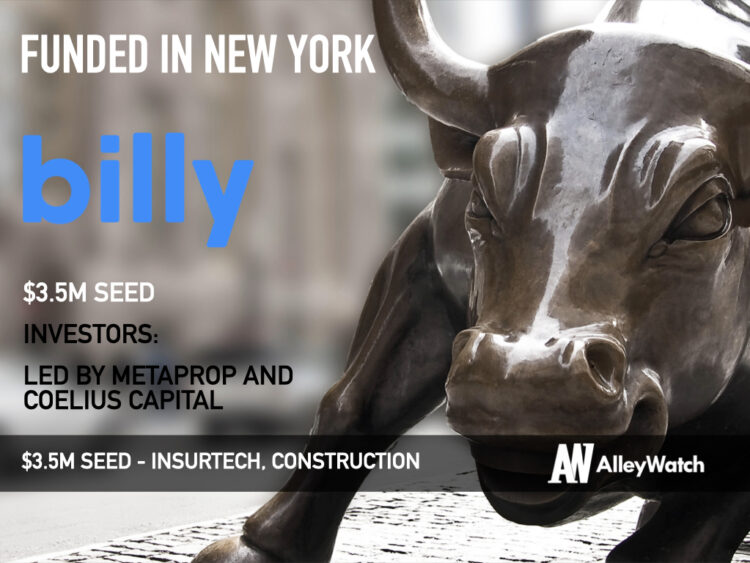A typical construction project involves a multitude of key stakeholders. Each with a vested interest not only in the success of a project but also in managing the liability. While there are countless vendors that can help commercial real estate property managers, owners, and developers handle the actual management of a project, ensuring that liability and risk are managed properly is a key pain point. Billy has developed an end-to-end insurance and risk management platform, specifically for the construction industry, that ensures all stakeholders are able to know what coverage they have, identify gaps, verify coverage, and save on insurance costs along the way. Offered as a SaaS annual subscription, Billy is able to centralize compliance requirements, streamlining the process in which parties are approved for projects.
AlleyWatch caught up with Billy CEO and Cofounder Nyasha Gutsa to learn more about the inspiration for the business, challenges faced as a first-time founder, the company’s strategic plans, latest round of funding, and much, much more.
Who were your investors and how much did you raise?
We announced a $3.5 million seed funding round led by MetaProp and Coelius Capital with participation from Village Global, Shadow Ventures, Hustle Fund, and Laguna Canyon Group. The round was oversubscribed, including several pre-seed investors, and brought total funding for the company to $4.25 million in 2021 alone.
Tell us about the product or service that Billy offers.
We make it simple for businesses to connect and do insurance. We do this by:
- Aggregating existing insurance data.
- Finding potential gaps.
- Identifying potential savings.
 What inspired the start of Billy?
What inspired the start of Billy?
We originally wanted to solve for payments and compliance for construction companies. We pivoted to insurance because there are already many players on the market (such as Bill.com and Melio) that solve for payments very well.
We recognized that every business needs insurance — but we learned that more than 40% of small to midsized businesses do not have it. Even if they do have insurance, the user experience of accessing and managing it is messy and complicated for these businesses. We found a way to make insurance a better user experience by starting with construction companies.
How is billy different?
We’re the only end-to-end insurance management service. With billy, businesses can access their insurance, find potential gaps, verify third-party insurance coverage, and help identify potential savings on your insurance.
What market does Billy target, and how big is it?
We are targeting the construction industry, which accounts for 13% of the global gross domestic product.
What’s your business model?
We charge an annual fee for the software.
What are your post-COVID office plans?
Our team is geographically distributed across the United States. We are a remote-first company at our core, but we offer access to WeWork and other coworking spaces to our employees.
What was the funding process like?
We are first-time founders, so we didn’t know who to approach or how to pitch our company at first. Initially, we targeted large VCs, but we either did not have a product, traction, or the VC did not invest in our area of expertise. We ended up finding success by working with VCs that invest in proptech and insurtech. It took us around 45 days from start to finish.
What are the biggest challenges that you faced while raising capital?
I am a founder of color who is also a migrant. It costs a lot of money to build a product to get the traction some VCs are looking for; therefore, it’s a chicken or egg scenario.
What factors about your business led your investors to write the check?
The main factors that led to that included our domain expertise in construction and technology, plus early validation from our initial customers in beta. We were able to begin charging for the product three and a half months after we started writing code.
What are the milestones you plan to achieve in the next six months?
We will keep driving toward our first milestone of aggregating existing insurance data end to end, launching some key integrations, and ensuring our live verification API can provide continuous verification of existing insurance programmatically to insureds.
What advice can you offer companies in New York that do not have a fresh injection of capital in the bank?
Find investors who are experts in your area and focus on those investors and the milestones they look for to make an investment. Secondly, you need to understand the problem you are solving and what makes you different from incumbents.
Where do you see the company going now over the near term?
We’re looking forward to our continuous expansion in the United States.






